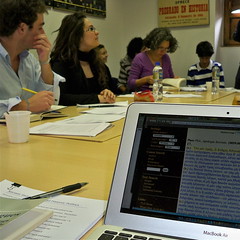BOGOTÁ, COLOMBIA – Today I gave a seminar on Plato’s Apology at the Universidad de los Andes to graduate and undergraduate students and faculty. The seminar was based on a paper I wrote entitled, Socratic Disturbances and Platonic Politics.
I argue in that paper that the Apology is a dialogue between Socrates and the “men of Athens.” In order to discern the dynamics of this dialogue, the paper follows those moment when the “men of Athens” create disturbances (thorubein) in response to the things Socrates says. These disturbances suggest the degree to which the practice of Socratic politics provokes those with whom he is engaged to think and act differently.
The paper also further develops the difference between the practice of Socratic politics as it is performed in the Platonic dialogues and the politics of Platonic writing as it presents itself to us in the written texts. The end of the paper attempts to lend some determination to the way Plato practices politics in his writing by thinking through the deep symbolism of the proposal Plato puts into the mouth of Socrates that his punishment should be to receive free meals for life in the Prytaneion. The Prytaneion was the center of Athenian life, the site of the hearth of Hestia, and the suggestion, which is quite likely a Platonic creation, emphasizes the importance of attempting to integrate the practices of philosophical politics into the very heart of the city.
The participants in the seminar were excellent. They had prepared by reading the Apology with great care and considering the details of my paper. I was encouraged to think more deeply about a few of the issues I raise in the paper, particularly about the differences between Platonic and Socratic politics.
One suggestion by Catalina González Quintero was particularly helpful insofar as it invited me to consider further if the Socratic practice of politics is essentially provocative and negative – as suggested by the gadfly metaphor – and Platonic politics is more educative and positive, concerned to cultivate habits of thinking and acting in the citizens of the city. I am concerned about divorcing these two dimensions of politics, but there might be a sense in which Socratic politics leads with provocation and moves only hesitantly toward education, while Platonic politics is concerned primarily with education, even if it retains always a provocative dimension.


Tournier on Deleuze:
“We soon came to fear his talent for seizing upon a single of our words and using it to expose our banality, stupidity, or failure of intelligence. he possessed extraordinary powers of translation and rearrangement: all of the tired philosophy of the curriculum passed through him and emerged unrecognizable but rejuvenated, with a fresh, undigested, bitter taste of newness that we weaker lazier minds found disconcerting and repulsive.”
quite a contrast to many of the reports from Wittgenstein’s seminars.
I appreciate the effort to widen the focus beyond justifications, seems that some understanding of speech-acts might be useful here.
on the enabling/vital role of habits for being a gadfly see:
http://rauli.cbs.dk/index.php/foucault-studies/article/view/3127/3298
http://routine.electracy.com/2010/01/conceptual-persona.html